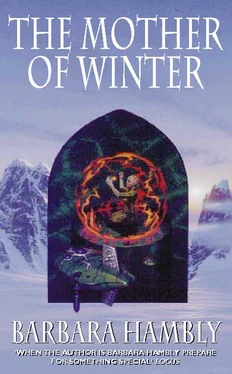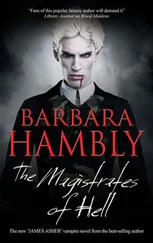This was how Gil saw him in her dream the second night, when she realized that he had to die.
They had made love, and she dreamed of making love to him again, in the cubicle they shared, a small inner cell in the maze of cells that were the territory of the Guards on the first level of the windowless Keep. She dreamed of falling asleep in the gentle aftermath, her smoky dark wilderness of hair strewed like kelp on the white-furred muscle of his chest, the smell of his flesh and of the Guards’ cooking, of leather oil from her weaponry and coat, filling her nostrils, smells for which she had traded the car exhaust and synthetic aromatics of a former home.
She dreamed that while still she slept he sat up and drew the blankets around him. His white hair hung down on his shoulders, and under the scarred lids his eyes were hard and thoughtful as he looked down at her. There was no gentleness in them now, no love—barely even recognition.
Then he began, while she slept, to work magic upon her, to lay words on her that made her foolish with love, willing to leave her friends and family, her studies at the University of California, as she had in fact left all the familiar things of the world of her birth. He lay on her words that made her, from the moment of their meeting, his willing slave.
All the peril she had faced against the Dark Ones, all the horror and fire, the wounds she had taken, the men she had killed, the tears she had shed … all were calculated, part of his ploy. Taken from her with his magic, rather than freely given for love of him.
Her anger was like a frozen volcano, outraged, betrayed, surging to the surface and destroying everything in its path. Rape, her mind said. Betrayal, greed, lust, hypocrisy … rape.
But he had laid spells on her that kept her asleep.
She would not be free of him, she thought, until he was dead.
She woke and found that she had her knife in her hand. She lay in the comer of the bishop’s courtyard, fire between her and the night. Yoshabel, tethered nearby, had raised her head, long ears turning toward the source of some sound. Ingold, his back to the embers, listened likewise, the shoulders of his robe and the mule’s shaggy coat dyed rose with the embers’ reflection. Gold threads laced the wet edges of the slunch bed, the leather wrappings of the books. Somewhere a voice that might have been human, half a mile or more away, was blubbering and shrieking in agony as something made leisurely prey of its owner.
Good, she thought, calm and strangely clear. He’s distracted.
Why did she feel that the matter had been arranged?
The blanket slid from her as she rose to hands and knees, knife tucked against her side. In her bones, in her heart, with the same awareness by which she knew the hapless ghoul was being killed for her benefit, she also knew herself to be invisible to the stretched-out fibers of Ingold’s senses, invisible to his magic. If she kept low, practiced those rites of silence the Guards had taught, she could sever his spine as easily as she’d severed that of the thing that had torn open her face.
His fault, too, she thought bitterly, surveying the thin fringe of white hair beneath the close-fit lambskin cap. His doing. His summoning, if the truth were known.
I was beautiful before …
She knew that wasn’t true. Thin-faced, sharp-featured, with a great witchy cloud of black hair that never would do what she wanted of it, she had never been more than passably pretty, a foil for the glamour of a mother and a sister whose goals had been as alien to her scholarly pursuits as a politician’s or a religious fanatic’s might have been.
The awareness of the lie pulled her back—pulled her fully awake—and she looked down at the knife in her hand.
Jesus, she thought. Oh, Jesus …
“Ingold …”
He moved his head a little, but did not take his eyes from the dark of the court. “Yes, child?”
“I’ve had a dream,” she said. “I want to kill you.”
“Once upon a time there was a boy …” Rudy Solis began.
“Once upon a time there was a boy.” Altir Endorion, Lord of the Keep of Dare, wriggled his back against the side of the big chest-bed to get comfortable and folded his small hands, the low glare of the hearth’s embers shining in his speedwell-blue eyes.
“And he lived in a great big palace …”
“And he lived in a great big palace.”
“With lots of servants to wait on him and do whatever he asked.”
The blue eyes closed. Tir was thinking about that one. He had long black lashes, almost straight, and his black forelock, escaping from the embroidered sheepskin cap he wore, made a diacritical squiggle between cap rim and the drawn-down strokes of his brows. In thought like this he seemed older than five years.
“He went riding every morning on horses by the river and all his servants had to go with him,” Tir went on after a moment. “They’d all carry bows and arrows, except the boy’s servants had to carry the boy’s bows and arrows for him. They’d shoot birds by the river …”
His frown deepened, distressed. “They shot birds that were pretty, not because they wanted to eat them. There was a black bird with long legs wading in the river, and it had a little crown of white feathers on its head, and the boy shot at it with his arrows. When it flew away, the boy told his servants, ‘I would that you take this creature with net and lime,’ “ his voice stumbled over unfamiliar words, an antique inflection, “ ‘and bring it to me, for I will not be robbed of my … my quarry …’ What’s quarry, Rudy?” He opened his eyes.
“Quarry is what you catch when you go hunting.” Rudy gazed into the hearth, wondering how long it had been since black egrets had haunted the marshlands below the royal city of Gae. A hundred years? Two hundred? It was part of his wizardry to know, but at the moment he couldn’t remember. Ingold could have provided the information out of his head, along with a mild remark about junior mages who needed their notes about such things tattooed on their arms—along with their own names—for lagniappe. “Sounds like a mean boy to me, Pugsley.”
“He was.” Tir’s eyes slipped shut again, but his face was troubled now, as he picked and teased at the knot of deep-buried memories, the recollections of another life. “He was mean because he was scared all the time. He was scared … he was scared …” He groped for the thought. “He thought everybody was going to try to hurt him, so they could make somebody else king and not him. His daddy’s brothers, and their children. His daddy told him that. His daddy was mean, too.”
He looked up at Rudy, who had an arm around his shoulders where they sat side by side on the sheepskin rugs of the cell floor. Even the royal chambers of the Keep of Dare were mostly small and furnished simply with ancient pieces found in the Keep, or with what had been hewn or whittled since the coming of the remnant of the Realm’s people. The journey down the Great South Road, and up the pass to the Vale of Renweth at the foot of the still higher peaks, had been a harsh one. Those who’d gone back along the route the following spring in quest of furnishings thrown aside to lighten the wagons had found them not improved by a season under mud and snow.
“But why would being scared all the time make him be mean?” Tir wanted to know. “Wouldn’t people be nastier to him if he was mean?”
“If they were his daddy’s servants, they couldn’t be mean back,” pointed out Rudy, who’d learned a good deal about customary behavior in monarchies since abandoning his career as a motorcycle painter and freelance screw-up in Southern California. “And maybe when he was mean he was less scared.”
Читать дальше






